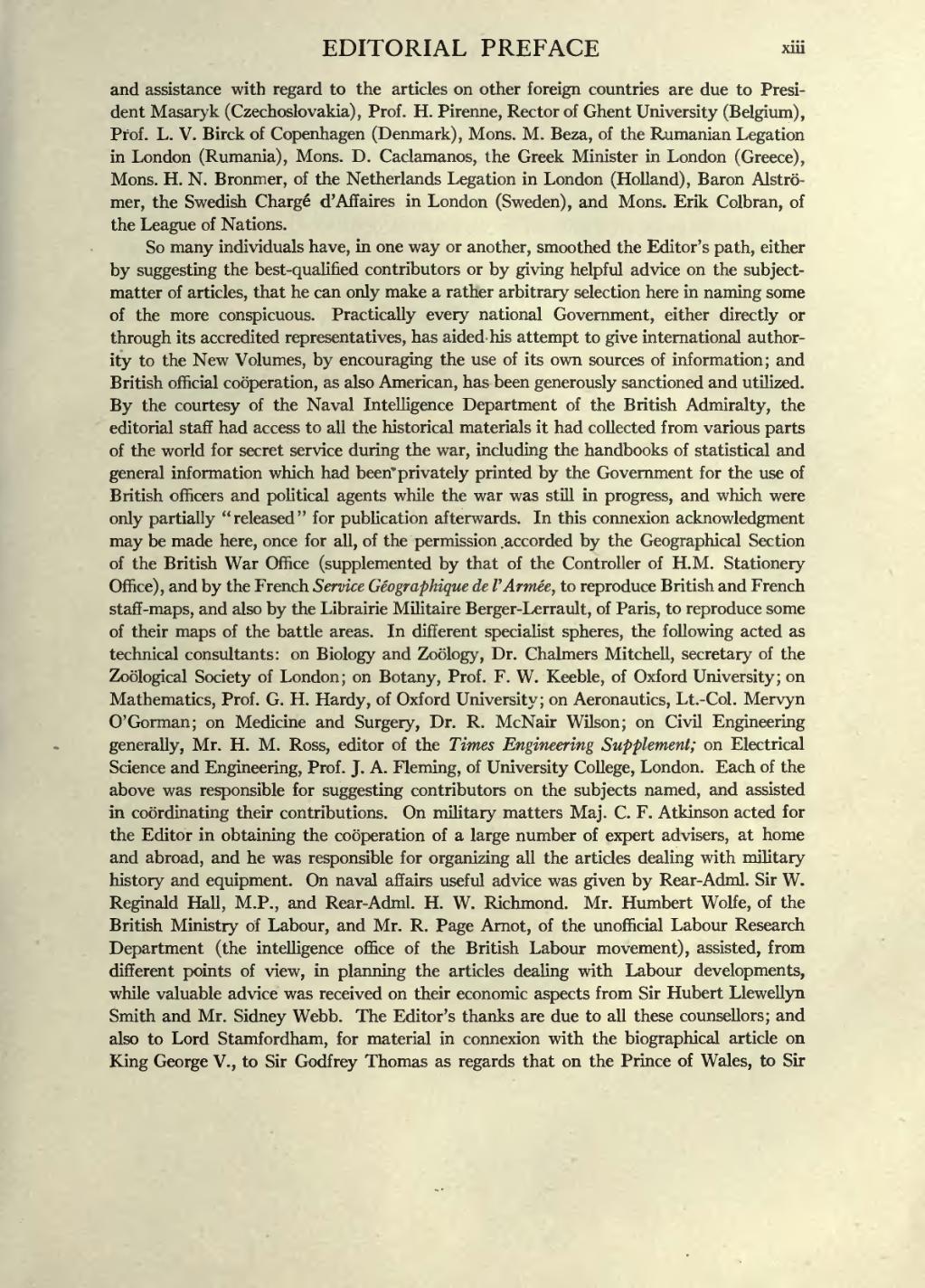and assistance with regard to the articles on other foreign countries are due to President Masaryk (Czechoslovakia), Prof. H. Pirenne, Rector of Ghent University (Belgium), Prof. L. V. Birck of Copenhagen (Denmark), Mons. M. Beza, of the Rumanian Legation in London (Rumania), Mons. D. Caclamanos, the Greek Minister in London (Greece), Mons. H. N. Bronmer, of the Netherlands Legation in London (Holland), Baron Alströmer, the Swedish Chargé d’Affaires in London (Sweden), and Mons. Erik Colbran, of the League of Nations.
So many individuals have, in one way or another, smoothed the Editor’s path, either by suggesting the best-qualified contributors or by giving helpful advice on the subject-matter of articles, that he can only make a rather arbitrary selection here in naming some of the more conspicuous. Practically every national Government, either directly or through its accredited representatives, has aided his attempt to give international authority to the New Volumes, by encouraging the use of its own sources of information; and British official coöperation, as also American, has been generously sanctioned and utilized. By the courtesy of the Naval Intelligence Department of the British Admiralty, the editorial staff had access to all the historical materials it had collected from various parts of the world for secret service during the war, including the handbooks of statistical and general information which had been privately printed by the Government for the use of British officers and political agents while the war was still in progress, and which were only partially “released” for publication afterwards. In this connexion acknowledgment may be made here, once for all, of the permission accorded by the Geographical Section of the British War Office (supplemented by that of the Controller of H.M. Stationery Office), and by the French Service Géographique de l’Armée, to reproduce British and French staff-maps, and also by the Librairie Militaire Berger-Lerrault, of Paris, to reproduce some of their maps of the battle areas. In different specialist spheres, the following acted as technical consultants: on Biology and Zoology, Dr. Chalmers Mitchell, secretary of the Zoölogical Society of London; on Botany, Prof. F. W. Keeble, of Oxford University; on Mathematics, Prof. G. H. Hardy, of Oxford University; on Aeronautics, Lt.-Col. Mervyn O’Gorman; on Medicine and Surgery, Dr. R. McNair Wilson; on Civil Engineering generally, Mr. H. M. Ross, editor of the Times Engineering Supplement; on Electrical Science and Engineering, Prof. J. A. Fleming, of University College, London. Each of the above was responsible for suggesting contributors on the subjects named, and assisted in coördinating their contributions. On military matters Maj. C. F. Atkinson acted for the Editor in obtaining the cooperation of a large number of expert advisers, at home and abroad, and he was responsible for organizing all the articles dealing with military history and equipment. On naval affairs useful advice was given by Rear-Adml. Sir W. Reginald Hall, M.P., and Rear-Adml. H. W. Richmond. Mr. Humbert Wolfe, of the British Ministry of Labour, and Mr. R. Page Arnot, of the unofficial Labour Research Department (the intelligence office of the British Labour movement), assisted, from different points of view, in planning the articles dealing with Labour developments, while valuable advice was received on their economic aspects from Sir Hubert Llewellyn Smith and Mr. Sidney Webb. The Editor’s thanks are due to all these counsellors; and also to Lord Stamfordham, for material in connexion with the biographical article on King George V., to Sir Godfrey Thomas as regards that on the Prince of Wales, to Sir
